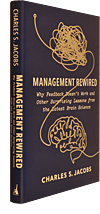Storytelling’s Value for Management
A review of Management Rewired, by Charles S. Jacobs.
(originally published by Booz & Company)Management Rewired: Why Feedback Doesn’t Work and Other Surprising Lessons from the Latest Brain Science
By Charles S. Jacobs
Portfolio, 2009, 216 pages
 Over the past 20 years, advances in brain science have revolutionized our understanding of how the mind works. Many of these findings have been published in popular books, but their implications for management have been less widely written about. In Management Rewired: Why Feedback Doesn’t Work and Other Surprising Lessons from the Latest Brain Science, management consultant Charles S. Jacobs presents a handy overview of developments in the field of brain science and their implications for managers’ actions. (See “Managing with the Brain in Mind,” by David Rock, s+b, Autumn 2009.)
Over the past 20 years, advances in brain science have revolutionized our understanding of how the mind works. Many of these findings have been published in popular books, but their implications for management have been less widely written about. In Management Rewired: Why Feedback Doesn’t Work and Other Surprising Lessons from the Latest Brain Science, management consultant Charles S. Jacobs presents a handy overview of developments in the field of brain science and their implications for managers’ actions. (See “Managing with the Brain in Mind,” by David Rock, s+b, Autumn 2009.)
Darwinian perspectives are everywhere these days, and the author suggests that in management, the old “billiard ball” Newtonian paradigm (in which people are moved by external forces) is being replaced by one based on natural selection. The human mind, as a product of evolution, functions on Darwinian principles; we don’t record an external reality so much as we create it, making multiple drafts as we try to fit it into coherent patterns. The drafts that survive determine what we notice and what we accept, what we ignore and what we reject. And we hold on to these drafts with great tenacity, resisting external efforts to change them. As a result, management actions based on Newtonian dynamics have perverse outcomes. Rewards may be seen as punishments, and vice versa, because people continually use deeper contexts to interpret them. Extrinsic rewards, as well as incentives, may undermine commitment because they trivialize the behaviors they are designed to encourage.
In this upside-down, counterintuitive world, where actions often produce outcomes that are the opposite of those intended, the author suggests that managers have to think less like Aristotle and more like Socrates. The vehicle for progress, in other words, is not the answer reached through logic but the question addressed through stories. The objective is not to control but, as Peter Drucker suggested many years ago, to create an environment that promotes self-control. Managers need to reach back to the most ancient learning tool we have — the compelling narrative that engages us. The role of emotion in decision making, after decades of denigration by management theorists, turns out to be prime, in light of the recent research. It is impossible for us to make decisions if there is no emotional component to the process. Only stories can bring together context, relationships, and the emotional mind — the essential ingredients of this new approach, where the environment is seen as a source of opportunity to create the behavior one desires. These are also the ingredients of great strategy: Stymied outside Troy, the Greeks turned to the wily Odysseus, who created a situation, supported by a compelling story, that enticed the Trojans to bring the attackers into their city.
These tales of what one might call “ecological judo” are fun to revisit, and it is delightful to find examples in brilliant corporate strategies, where weaknesses are turned into strengths and underdogs can aspire to be top dogs. But this is a young managerial paradigm — a proverbial 97-pound weakling — whose conclusions challenge the hegemony of conventional managerial wisdom, which is still in thrall to neoclassical economics. It is to be hoped that, in combination with developments in other fields such as behavioral economics, progress in understanding the management implications of brain science will enable the emerging paradigm to stand up to the intellectual bullies who, at least up until the 2008 financial meltdown, continued to kick sand in everyone else’s face.![]()
Reprint No. 09311
Author profile:
- David K. Hurst is a contributing editor of strategy+business. His writing has also appeared in the Harvard Business Review, the Financial Times, and other leading business publications. Hurst is the author of Crisis & Renewal: Meeting the Challenge of Organizational Change (Harvard Business School Press, 2002).


